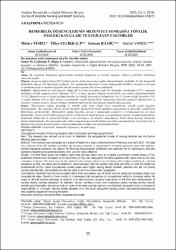| dc.contributor.author | Temel, Münire | |
| dc.contributor.author | Çelikkalp, Ülfiye | |
| dc.contributor.author | Bilgiç, Şebnem | |
| dc.contributor.author | Varol, Gamze | |
| dc.date.accessioned | 2022-05-11T14:12:43Z | |
| dc.date.available | 2022-05-11T14:12:43Z | |
| dc.date.issued | 2020 | |
| dc.identifier.issn | 1309-5471 | |
| dc.identifier.issn | 2687-2498 | |
| dc.identifier.uri | https://doi.org/10.17049/ataunihem.478072 | |
| dc.identifier.uri | https://app.trdizin.gov.tr/makale/TXpZM05qTTVPUT09 | |
| dc.identifier.uri | https://hdl.handle.net/20.500.11776/5651 | |
| dc.description.abstract | Amaç: Bu araştırma hemşirelik öğrencilerinin mesleki kaygılarını ve mesleki kaygıları etkileyen faktörleri belirlemekamacıyla yapıldı.Yöntem: Araştırma Şubat-Nisan 2017 tarihlerinde bir devlet üniversitesi sağlık yüksekokulunda yürütüldü. Veriler hemşirelikbölümünde okuyan 230 öğrenciden toplandı. Veri toplamada öğrencilerin sosyo-demografik özellikleri, mesleği tercih etmeve sürdürme isteği ve mesleki kaygılara yönelik soruları içeren anket formu kullanıldı.Bulgular: Öğrencilerin en fazla kaygılı olduğu ilk üç konu mesleğine bağlı bir hastalığa yakalanmak (%77), toplumdamesleğine yönelik saygının yeterli olmaması (%77) ve lisans mezunu olmayan hemşirelerle aynı statüde değerlendirilmekti(%74). Öğrencilerin en az kaygı duyduğu konular ise istediği kurumda iş bulamamak (%6.5), bakım verdiği bireylerle (%3)ve sağlık ekibiyle (%4.3) etkin iletişim kuramamaktı. Kadın öğrencilerde, hemşireliği isteyerek seçmeyen öğrencilerde vemezuniyet sonrası hemşire olarak çalışmak istemeyen öğrencilerde bazı mesleki kaygılar daha fazlaydı.Sonuç: Öğrencilerin çalışan güvenliği ve mesleki statü başta olmak üzere mesleklerine yönelik çeşitli kaygılarıbulunmaktadır. Bu sonuçlara dayalı olarak öncelikle öğrencilerin klinik eğitimleri kapsamında iş güvenliği önlemlerininarttırılması gerekmektedir. Öğrencilerin eğitim hayatları süresince hemşireliği sevmeleri ve benimsemelerine de önemverilmelidir. Ayrıca hemşireliğin profesyonel bir meslek olarak kabul görmesi ve saygınlığının artması yönünde hemşirelerin,hemşirelik okullarının ve hemşirelik hizmeti veren kurumların iyi örnekler sunmalarına, birlik olarak hareket etmelerineihtiyaç bulunmaktadır. Bu çalışmadan elde edilen sonuçların hemşirelik okullarının eğitim planlamalarına yol göstereceği veöğrencilerin çalışma hayatına daha iyi hazırlanmalarına yardımcı olacağı düşünülmektedir. | en_US |
| dc.description.abstract | Aim: This research was carried out in order to determine the occupational anxiety of nursing students and the factors affecting these anxieties. Method: This research was conducted at a school of health of a state university between February and April 2017. The data was collected from 230 students attending the nursing program. A questionnaire including questions about the students’ sociodemographic attributes, the reasons for choosing this particular profession and eagerness for its maintenance, and also questions regarding occupational anxiety were used for data collection. Results: The first three issues the students were most anxious about were to contract a profession-related illness (77%), profession oriented lack of respect in the community (77%), and being put in the same equation with nurses who do not have a bachelor’s degree. The least concern the students were anxious about were not being able to find a position in a desired workplace (6.5%), not being able to establish a communication with the patients they deal with (3%) or with the healthcare professionals (4.3%). Some occupational anxiety areas were higher among female students, students who did not choose nursing intentionally, and students who did not want to work as a nurse after graduation. Conclusions: Students have various anxieties about their occupation, two of which were in particular employee safety, and occupational status. Based on these results, it is necessary that precautions on occupational safety be increased within the scope of clinical practise trainings of students. It is also necessary to place importance on the love and interiorisation of nursing during nursing education. In addition, nurses, nursing schools and institutions giving nursing services should provide good examples, and act as unity in order to increase nursing care as a professional occupation and to increase its respectability. It is thought that the results obtained from this study will guide nursing schools' educational planning and help students prepare for working life better. | en_US |
| dc.language.iso | tur | en_US |
| dc.identifier.doi | 10.17049/ataunihem.478072 | |
| dc.rights | info:eu-repo/semantics/openAccess | en_US |
| dc.title | Hemşirelik Öğrencilerinin Mezuniyet Sonrasına Yönelik Mesleki Kaygıları ve Etkileyen Faktörler | en_US |
| dc.title.alternative | Occupational Anxiety of Nursing Students After Graduation and Impacting Factors | en_US |
| dc.type | article | en_US |
| dc.relation.ispartof | Anadolu Hemşirelik ve Sağlık Bilimleri Dergisi | en_US |
| dc.department | Yüksekokullar, Sağlık Yüksekokulu, Hemşirelik Bölümü | en_US |
| dc.department | Fakülteler, Tıp Fakültesi, Dahili Tıp Bilimleri Bölümü, Halk Sağlığı Ana Bilim Dalı | en_US |
| dc.identifier.volume | 23 | en_US |
| dc.identifier.issue | 1 | en_US |
| dc.identifier.startpage | 23 | en_US |
| dc.identifier.endpage | 34 | en_US |
| dc.institutionauthor | Temel, Münire | |
| dc.institutionauthor | Çelikkalp, Ülfiye | |
| dc.institutionauthor | Bilgiç, Şebnem | |
| dc.institutionauthor | Varol, Gamze | |
| dc.identifier.trdizinid | TXpZM05qTTVPUT09 | en_US |



















